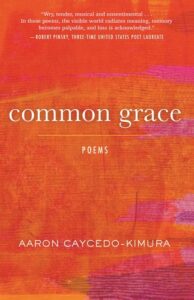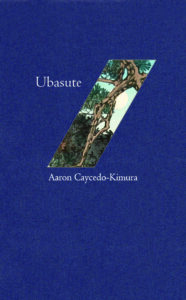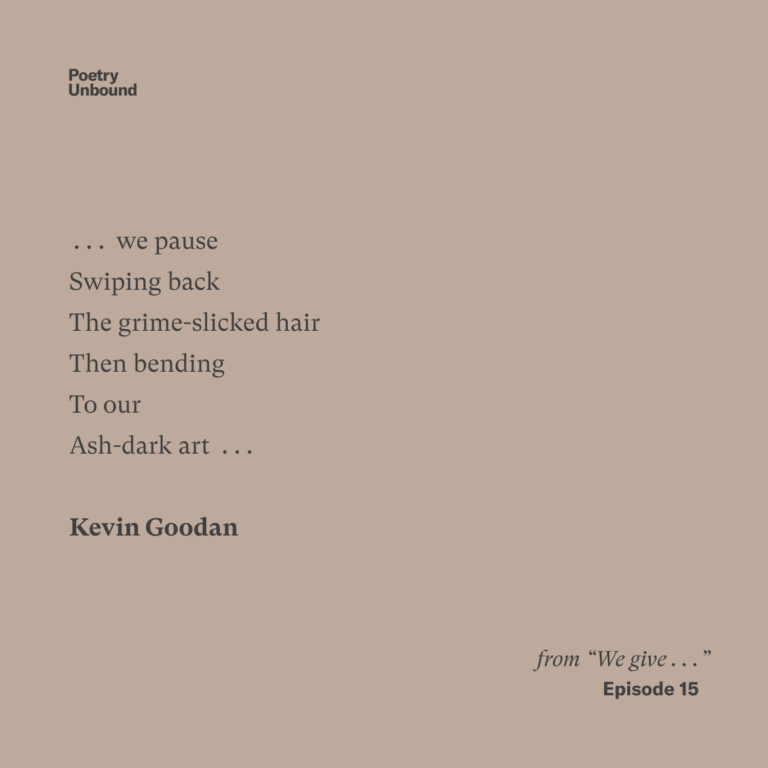Aaron Caycedo-Kimura
What’s Kept Alive
At the hingepoint of change, a poet walks through the garden his late father planted.
We’re pleased to offer Aaron Caycedo-Kimura’s poem, and invite you to connect with Poetry Unbound throughout this season.
Pre-order the forthcoming book Poetry Unbound: 50 Poems to Open Your World and join us in our new conversational space on Substack.
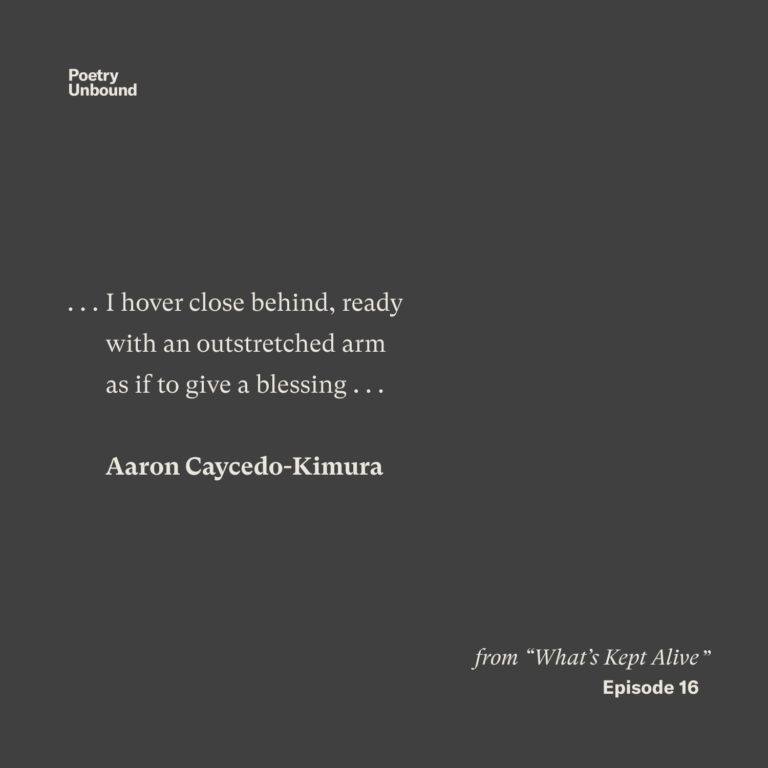
Guest
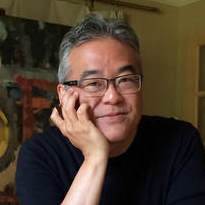
Aaron Caycedo-Kimura is a writer and visual artist. He is the author of two poetry collections: Ubasute (Slapering Hol Press 2021), which won the 2020 Slapering Hol Press Chapbook Competition, and the full-length collection Common Grace (Beacon Press 2022). His honors include a Robert Pinsky Global Fellowship in Poetry, a St. Botolph Club Foundation Emerging Artist Award in Literature, and nominations for the Pushcart Prize, Best of the Net, and Best New Poets anthologies.
Transcript
Pádraig Ó Tuama: My name is Pádraig Ó Tuama, and a number of years ago I got the chance to go back to the house that I lived in, in my twenties. It was amazing to have the opportunity to go in. And I opened the door to the room that I had lived in for four years, and put my hand on the ground, and felt like I was being made again, and touching who I was in my twenties by being in there, and honoring the ground. Place holds so much. Obviously, the material objects that are in there, but it is more than that. It’s who we’ve been in this place. And poetry that speaks of place is always speaking about more than just what’s there. What’s there holds something much bigger than the material reality of itself.
[music: “Praise the Rain” by Gautam Srikishan]
“What’s Kept Alive” by Aaron Caycedo-Kimura.
“She crunches her walker
into the sea of pebbles
surrounding the stepping-stones,
“tells me, This bush
with flowers is Japanese.
That one is too, but different.
“I hover close behind, ready
with an outstretched arm
as if to give a blessing.
“Pick that large weed
near the lantern—by the roots—
and throw it into the pail.
“My father planned and planted
this garden fifty years ago—
hidden behind the fence
of their Santa Rosa tract home—
“but he’s gone now.
She hires a hand to rake leaves,
prune branches once a month.
“Soon she’ll be gone.
I’ll sell the house,
return to Connecticut.
“A stranger will buy it,
become caretaker of the garden,
but won’t know that from their
“San Francisco apartment
my father transported
the Japanese maple, cradled
in a small clay pot —
“the momiji now guarding
the north corner—
and that my mother chided
him for bothering with a dying shrub.”
[music: “First Grief, First Air” by Gautam Srikishan]
The first time I read this poem, I was so moved by how it unfolds and unfolds – the story of the garden, the son and the mother in the garden, how the garden came to be, and the worry about who’s going to caretake it in the future. Or maybe it’s not even a worry, just the awareness somebody else is going to be here. And then right at the end of this really short poem, another unfolding – the chiding that happens between spouses. “What are you doing bothering with that dying shrub?” Over and over again, there’s recognizable life happening in so many of these small, elegant turns. Each of these little stanzas contains and unfolds and unfolds more information about the point of view of the son, about the experience of the parents, about the loss, about the future, knowing that she’s going to die. And then the past, again, the long story of their fifty years and longer together, and the way that this garden, in a certain sense, and the plants in the garden, hold in themselves the story of a marriage.
[music: “Into the Earth” by Gautam Srikishan]
The mother in this poem is using a walker. There’s a “sea of pebbles” in the garden. And the son is hearing from her bits about what’s in the garden. “This bush is Japanese. / That one too, but different.” And he is hovering close behind. “I hover close behind, ready / with an outstretched arm”. And the verb “hover” is such an interesting one. I mean, obviously the immediate meaning of it is that he’s standing poised, ready if she needs some support to be able to give her that support. But “hover” also means not quite on the ground. Who was in this place? Who is standing here? The father’s gone, the mother’s soon to be gone. And then him, he’ll sell the house and return back to Connecticut. So, in a certain sense, he’s saying we’re not quite on this land of our garden anymore. People have departed, and are almost departing, and are ready to depart, and barely there all at the same time.
What they are there with, though, is care. The garden has been their tending for so long. And this is a poem about the process of saying goodbye to this most extraordinary repository of story and dedication and time and love. But the relationships will remain.
[music: “Ashed to Air” by Gautam Srikishan]
Aaron Caycedo-Kimura is a Japanese American poet, and you see the ways within which Japan is present in this poem. And this garden that we’re hearing about throughout this poem has pebbles, and stepping stones, and different kinds of bushes, Japanese bushes, some with flowers. And then there’s weeds as well. And there’s a pail waiting to hold the weeds. There’s a lantern. And then that Japanese maple also, which had been “…cradled / in a small clay pot—” What a gorgeous choice of word here, “cradled,” like a baby. “The momiji,” which is “guarding the north corner.” Therefore I see this garden as having a sense of space. It may not be huge, I don’t know, but there is space within it for holding a variety of these plants, each of which seems to hold something very important in terms of time and love.
I’ve got so many friends for whom gardening is something much more than just growing. It is a way of turning off. It is a way of getting your hands dirty, literally, and that the dirt itself is the place of sustenance and growth. It is a way, too, of marking a year and marking time. “This plant is gone, but it’ll be back next year. I always love it when the flowers come up here, or when the leaves turn, or when I prune it back, or when I rake.”
A garden is a way within which to hold time. And there’s cyclical time happening in the family. The father is gone, the mother is soon to be gone. The house will be passed on. But the tending of the garden and the way that the garden holds time, the way that a household holds time, all of these things are present in him as he’s holding together the time that’s changing.
[music: “Family Tree” by Gautam Srikishan]
Aaron Caycedo-Kimura uses the word “gone” twice in close succession, “but he’s gone now.” And then “Soon she’ll be gone.” There is death occurring in this poem. But the title of the poem is: “What’s Kept Alive.” And what is kept alive? The memory of the garden, the garden for so long, the love between them, himself. All of these things are being kept alive while he’s still meditating on someone who will be gone, someone who is gone. And also the relationship with place is changing, certainly. Maybe it’s not gone. But somehow that garden is hidden.
He says, “My father planned and planted / this garden fifty years ago— / hidden behind the fence / of their Santa Rosa tract home—”. In a way this is a poem about marriage and the privacies of family life. Between the spouses in this marriage, there was tension at one point, a chiding “for bothering with a dying shrub.” This small shrub that stayed alive was kept alive by the father, by the mother, by whoever tended that garden over those many decades. This, too, is something that holds the possibility of life, holds the possibility of sustaining, and has a story within it, about being cared for, about being bothered about by somebody, the father initially bothered about this dying shrub. What else did the members of this family bother about which kept them alive?
That’s an insight, I think, that nurtures this poem, that makes this garden something that lives on in memory and lives on in invitation to consider how the small things that we do for the sake of a bit of love, for the sake of a bit of beauty, and the things that are being done to keep that alive in the garden, are of such importance and hold together something that’s of vital integrity to himself and to the family.
[music: “The Edge of All There Is” by Gautam Srikishan]
“What’s Kept Alive” by Aaron Caycedo-Kimura.
“She crunches her walker
into the sea of pebbles
surrounding the stepping-stones,
“tells me, This bush
with flowers is Japanese.
That one is too, but different.
“I hover close behind, ready
with an outstretched arm
as if to give a blessing.
“Pick that large weed
near the lantern—by the roots—
and throw it into the pail.
“My father planned and planted
this garden fifty years ago—
hidden behind the fence
of their Santa Rosa tract home—
“but he’s gone now.
She hires a hand to rake leaves,
prune branches once a month.
“Soon she’ll be gone.
I’ll sell the house,
return to Connecticut.
“A stranger will buy it,
become caretaker of the garden,
but won’t know that from their
“San Francisco apartment
my father transported
the Japanese maple, cradled
in a small clay pot —
“the momiji now guarding
the north corner—
and that my mother chided
him for bothering with a dying shrub.”
Chris Heagle: “What’s Kept Alive” comes from Aaron Caycedo-Kimura’s book Common Grace. Thank you to Beacon Press who gave us permission to use Aaron’s poem. Read it on our website at onbeing.org.
[music: “Praise the Rain” by Gautam Srikishan]
Poetry Unbound is: Gautam Srikishan, Eddie Gonzalez, Lilian Vo, Lucas Johnson, Amy Chatelaine, Kayla Edwards, and me, Chris Heagle.
Our music is composed and provided by Gautam Srikishan and Blue Dot Sessions.
This podcast is produced by On Being Studios, which is located on Dakota land. Open your world to poetry with us by subscribing to our Substack newsletter at poetryunbound.org. You may also enjoy our other podcast On Being with Krista Tippett, or our newsletter, The Pause. Visit us at onbeing.org to find out more.
[music: “Praise the Rain” by Gautam Srikishan]
Pádraig Ó Tuama: Friends, thanks very much for listening to Poetry Unbound, whether you’re new or you’ve listened to them all — your attention makes everything worthwhile. And I’ve got some news: I’ve written a book, Poetry Unbound: 50 Poems to Open Your World. There’s 50 poems, each with a fresh essay written by me. I’d love if you’d pre-order it, or pre-order a few, and join up to our free interactive newsletter. Links to everything at poetryunbound.org.
Books & Music
Recommended Reading
The On Being Project is an affiliate partner of Bookshop.org and Amazon.com. Any earnings we receive through these affiliate partnerships go into directly supporting The On Being Project.





